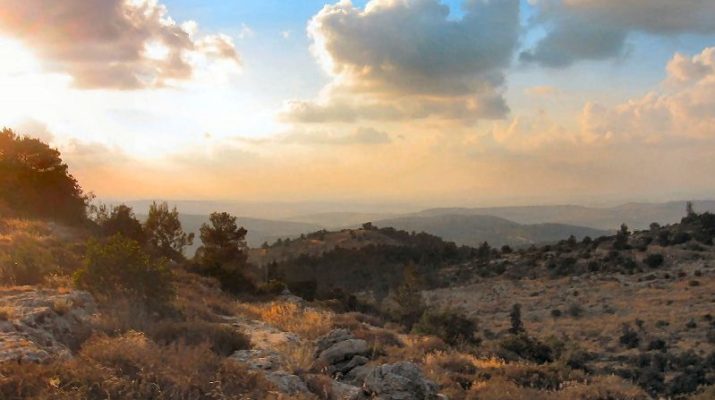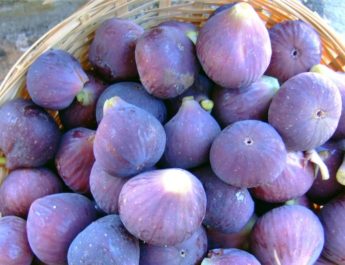Psalm 76
To the leader:A with stringed instruments.B A PsalmC of Asaph.D A Song.
A “leader” = natsach. Properly, something that glitters from a distance. So, something that stands out, excels, has status/standing (such as a chief musician or superintendent of Temple services). This can also mean to be permanent or enduring.
B “stringed instruments” = neginah. 13x in OT. From nagan (to strike a stringed instrument, to pluck or play it). This is music, a song, a taunt, or a stringed instrument. It can also be a poem given a musical setting.
C “Psalm” = mizmor. From zamar (making music; used specially of music to worship God; music with singing, singing praise, singing psalms); may be from zamar (to trim or prune). This is a melody or a psalm.
D “Asaph” = Asaph. From asaph (to gather, assemble, bring, take away, destroy, or remove). This is Asaph, meaning “gatherer” or “collector.” It is a personal name.
E “Judah” = Yehudah. Probably from yadah (to throw one’s hands into the air in a gesture of praise); from yad (hand). This is Judah, meaning “praised.”
F “God” = Elohim.
G “known” = yada. This is to know, acknowledge, advise, answer, be aware, be acquainted with. Properly, this is to figure something out by seeing. It includes ideas of observation, recognition, and care about something. It can be used causatively for instruction, designation, and punishment.
his nameH is greatI in Israel.J
H “name” = shem. May be from sum (to put, place, set). This is name, fame, renown. A name was thought to indicate something essential about a person – something about their individuality. So, this word can also mean honor, authority, or character.
I “great” = gadol. From gadal (to grow up, become great, become wealthy – to advance. The root meaning may be to twist in the sense of the process of growing). This is great, high, bigger, noble, old, marvelous. It can also refer to someone who is powerful or distinguished.
J “Israel” = Yisrael. Related to “God” in v1. From sarah (to persist, exert oneself, contend, persevere, wrestle, prevail) + el (see note F above). This is Israel, meaning God strives or one who strives with God; new name for Jacob and for his offspring. This refers to the people and to the land.
2 His abodeK has been establishedL in Salem,M
his dwelling placeN in Zion.O
K “abode” = sok. 4x in OT. From sakak (to interweave, knit). This is a lair, thicket, den, or hiding place. It could also be a den or pavilion as made of intertwined boughs.
L “been established” = hayah. This is to be or become, to happen.
M “Salem” = Shalem. 2x in OT. From shalam (to be complete or sound; to have safety mentally, physically, or extending to one’s estate; so, if these things are safe and complete, the implication is that one would be friendly; and, if being friendly, one would make amends and that friendship would be reciprocated). This is Salem or Shalem, meaning “peaceful.” It is where Melchizedek is from in Genesis 14.
N “dwelling place” = meonah. 10x in OT. From maon (dwelling, den, haunt, retreat; can refer to the Tabernacle or Temple; can also be used for homes or animal lairs); from anah (to answer, respond, announce, sing, shout, or testify; to pay attention, which implies responding and, by extension, starting to talk; singing, shouting, testifying, etc.) OR from the same as onah (marriage, living together, marital duty). This is a dwelling place or refuge. It can be used to describe God’s dwelling in Zion or a place where animals live.
O “Zion” = Tsiyyon. Related to tsyiyyun (signpost, monument); from tsavah (to charge someone, to command, order); from the same as tsiyyah (dryness drought); from a root meaning parched as desert, dry land. Zion can refer to a mountain in Jerusalem as well as another name for Jerusalem itself or the people.
3 There he brokeP the flashingQ arrows,R
P “broke” = shabar. This is break, collapse, destroy, break in pieces, tear. It is bursting in a literal or figurative sense.
Q “flashing” = qeshet. Perhaps from qush (to set a trap, lure, ensnare) OR from qashah (to be fierce, cruel, dense, tough, severe). This is a bow, arrow, or archer. Bow can be used figuratively for strength.
R “arrows” = resheph. 7x in OT. Perhaps from saraph (to burn or kindle). This is a flame, thunderbolt, spark, arrow, fever, plague. Earliest sense was of a burning coal and all other senses derive from that by analogy.
the shield,S the sword,T and the weapons of war.U SelahV
S “shield” = magen. From ganan (to surround, cover, defend, protect). This is a shield, defense, or figuratively a protector. It can also be used for a crocodile’s hide.
T “sword” = chereb. From charab (to attack, slay). This is any sharp instrument like a sword, dagger, axe, or mattock.
U “weapons of war” = milchamah. From lacham (to eat or feed on; figuratively, to battle as a kind of consumption/destruction). This is battle, war, fighting, or one who fights (i.e. a warrior).
V “Selah” = selah. From salal (to lift up, build, pile, extol, exalt; can also be used for opposing as a dam holds back water). This is to lift up or exalt. Also, “selah” in the psalms where its precise meaning is uncertain. It could be a pause in the music, a moment of silence. It could signal a change in the service or mean something akin to amen.
4 Glorious areW you, more majesticX
than the everlastingY mountains.Z
W “glorious are” = or. This is to light, shine, set on fire – to be luminous in a literal or figurative sense.
X “more majestic” = addir. From adar (wide, glorious, honorable, great, magnificent). This is majestic, excellent, mighty, powerful, or noble.
Y “everlasting” = tereph. From taraph (to tear or pluck off into pieces, to rend or catch; to supply with food). This is something that is ton – spoil, prey, food, or some other fragment.
Z “mountains” = harar. 12x in OT. From the same as har (mountain, hill, hilly region). This is hill or mountain.
5 The stoutheartedAA were stripped of their spoil;BB
they sankCC into sleep;DD
AA “stouthearted” = abbir + leb. Abbir is 17x in OT. From abir (strong, mighty); from abar (to fly, soar). This is mighty or valiant. It could refer to a mighty one broadly, an angel, or a bull. Leb may be related to labab (to encourage; properly, to be encased as with fat; used in a good sense, this means to transport someone with love; used in a bad sense, it can mean to dull one’s senses). This is the heart, courage, one’s inner self, the mind, or the will. Heart is only used in a figurative sense in the Old and New Testaments.
BB “stripped of…spoil” = shalal. 16x in OT. This is to strip or draw out. It is often used specifically for plundering.
CC “sank” = num. 6x in OT. This is to sleep because drowsy.
DD “sleep” = shenah. From yashen (to be languid or go slack; it can mean to sleep, become old or stale, or die). This is sleep.
none of the troopsEE
was able to liftFF a hand.GG
EE “troops” = enosh + chayil. Literally, “mighty men.” Enosh is from anash (to be weak, sick, or frail). This is human, humankind, another. It is mortal. Chayil is from chul (to be firm, strong, prosperous; to endure). This is strength, wealth, ability, activity. It can refer to soldier or a company of soldiers as well as goods. It is a force of people, means, or goods. It can speak of valor, virtue, or strength.
FF “able to lift” = matsa. This is to find, catch or acquire. It can also mean to come forth or appear. Figuratively, this can mean to meet or be together with.
GG “hand” = yad. This is hand, ability, power. Hand in a literal sense, but also what one can do or the means by which one does it.
6 At your rebuke,HH O God of Jacob,II
both riderJJ and horseKK lay stunned.LL
HH “rebuke” = gearah. 15x in OT. From gaar (to rebuke, corrupt, or chide). This is a rebuke, reproof, or threat.
II “Jacob” = Yaaqob. From the same as aqeb (heel, hind part, hoof, rear guard of an army, one who lies in wait, usurper). This is Isaac’s son and his descendants. The name means heel-catcher or supplanter.
JJ “rider” = rekeb. From rakab (to ride an animal or in some vehicle; also, bringing on a horse). This is a vehicle, wagon, or chariot. It can be cavalry or an individual rider.
KK “horse” = sus. Root may mean to skip as in jump for joy. This is a crane or a swift bird. It is also a horse as leaping.
LL “lay stunned” = radam. 7x in OT. This is asleep or sleeper. It refers to a heavy sleep – being stupefied either of sleep or death.
7 But you indeed are awesome!MM
Who can standNN beforeOO you
when once your anger is roused?PP
MM “are awesome” = yare. This is to fear, be afraid, dreadful. It can also refer to fearful reverence – to fear in a moral sense is to say to revere, respect.
NN “stand” = amad. This is to stand up in a literal or figurative sense. So it can be establish, continue, endure, take a stand, act, be a servant, stand still, remain, stand against an enemy.
OO “before” = paneh. Literally “in your presence.” From panah (to turn, face, appear). This is face in a literal or figurative sense. It could be face, presence, anger, respect. It can also be used of God to indicate divine favor or presence.
PP “anger is roused” = aph. From anaph (to be angry; properly, breathing hard as a signifier of being enraged). This properly refers to the nose or nostril and by extension the face. It can specifically refer to anger or wrath as one breathes hard and nostrils flare in times of great anger.
8 From the heavensQQ you utteredRR judgment;SS
the earthTT fearedUU and was stillVV
QQ “heavens” = shamayim. Root may mean being lofty. This is sky, the air, or heaven. It is in a dual noun form so this might refer to the part of the sky where the clouds move on the one hand and the part beyond that where the sun, moon, and stars are on the other hand.
RR “uttered” = shama. This is to hear, call, consent, or consider. It implies listening intelligently, giving attention, and, because of these two factors, obedience and action are often implied.
SS “judgment” = din. This is to judge, defend, dispute, govern, quarrel, plead.
TT “earth” = erets. Root may mean to be firm. This is earth, ground, field land, or country.
UU “feared” = yare. Same as “are awesome” in v7. See note MM above.
VV “was still” = shaqat. This is to be quiet, rest, calm, settle, be still, peace.
9 when God rose upWW to establish judgment,XX
to saveYY all the oppressedZZ of the earth. Selah
WW “rose up” = qum. To arise, stand, accomplish, establish, abide. This is rising as in rising against, getting up after being sick or asleep, arising from one state to another, becoming powerful, or rising for action. It can also be standing in a figurative sense.
XX “judgment” = mishpat. From shaphat (to judge, defend, pronounce judgment, condemn, govern). This is a verdict or formal sentence whether from humans or from God. It includes the act of judging as well as the place that judging takes place, the suit itself, and the penalty. Abstractly, this is justice, which includes the rights of the participants.
YY “save” = yasha. To deliver, defend, help, preserve, rescue, be safe. Properly, to be open, wide or free, which implies being safe. Used causatively, it means to free.
ZZ “oppressed” = anav. From anah (to be bowed down; can refer to a sense of humility or to a sense of being browbeaten, oppressed, afflicted, or depressed; literal or figurative – depressed in mood or circumstance). This is poor, needy, afflicted as well as humble or meek.
10 HumanAAA wrathBBB serves only to praiseCCC you,
when you bind the last bitDDD of you wrath around you.EEE
AAA “human” = adam. Perhaps from adam (to be red, make ruddy); related to adamah (ground, dirt, earth). This is man, humankind, also Adam’s name. It refers to a human individual or humanity.
BBB “wrath” = chemah. From yacham (to be hot, mate; figuratively, to conceive). This is heat – figuratively it can be anger or fury. It can also refer to poison or venom as they can cause fever.
CCC “praise” = yadah. Related to “Judah” in v1. See note E above.
DDD “last bit” = sheerit. From shaar (properly, swelling up i.e. being left over; a remnant, remaining, being redundant). This is a remainder, residue, or survivor. It can also refer to posterity.
EEE “bind…around you” = chagar. This is to gird, bind, or arm. Generally, it is using a belt to gather up one’s garment so that it’s easier to run or move quickly.
11 Make vowsFFF to the LordGGG your God, and performHHH them;
FFF “make vows” = nadar. This is to vow or promise.
GGG “Lord” = YHVH. Related to “been established” in v2. From havah (to be, become) or hayah (see note L above). This is the name of the God of Israel, the self-existent and eternal one, the tetragrammaton. This pronunciation has been lost to time so “Lord” is generally used in its place.
HHH “perform” = shalam. Related to “Salem” in v2. See note M above.
let all who are aroundIII him bringJJJ giftsKKK
to the one who is awesome,LLL
III “around” = sabib. From sabab (turning around, going around; to surround, cast, walk, fetch; to revolve or border in a literal or figurative sense). This is a circuit or a circle. It could refer to an environment, one’s neighbors, or a circular path round about.
JJJ “bring” = yabal. 18x in OT. This is to lead, bring, carry, conduct. Properly, it means to flow. It can mean to bring or lead with fanfare.
KKK “gifts” = shay. 3x in OT. Perhaps from shavah (to equalize, resemble, agree with, compare, adjust, compose, place, or yield). This is a gift or present. It is something given as an act of homage.
LLL “awesome” = mora. Related to “are awesome” in v7. 12x in OT. From yare (see note MM above.). This is fear, dread, respect, or reverence. It can also be a fearful thing or action.
12 who cuts offMMM the spiritNNN of princes,OOO
who inspires fearPPP in the kingsQQQ of the earth.
MMM “cuts off” = batsar. This is to enclose, wall up, or make something inaccessible, impenetrable, isolated. It can also mean to fortify, something mighty. It can also mean to gather grapes.
NNN “spirit” = ruach. This is breath, wind, air, cool, spirit. This is wind, which resembles the breath and so this can be used figuratively for life itself or being frail/mortal/impermanent. It can refer to the air of the sky or the spirit.
OOO “princes” = nagid. From nagad (this is to declare, make conspicuous, stand in front, manifest, predict, explain). This is a commander or leader as the one who stands at the front, whether in a military, religious, or civic setting. It can also mean honorable or noble in an abstract sense.
PPP “inspires fear” = yare. Same as “are awesome” in v7. See note MM above.
QQQ “kings” = melek. From malak (to be or become king or queen, to rise to the throne, to be crowned; by implication, to take counsel). This is king or royal.
Image credit: “Panorama from Beth Meir” in Israel by Daniel Ventura.




